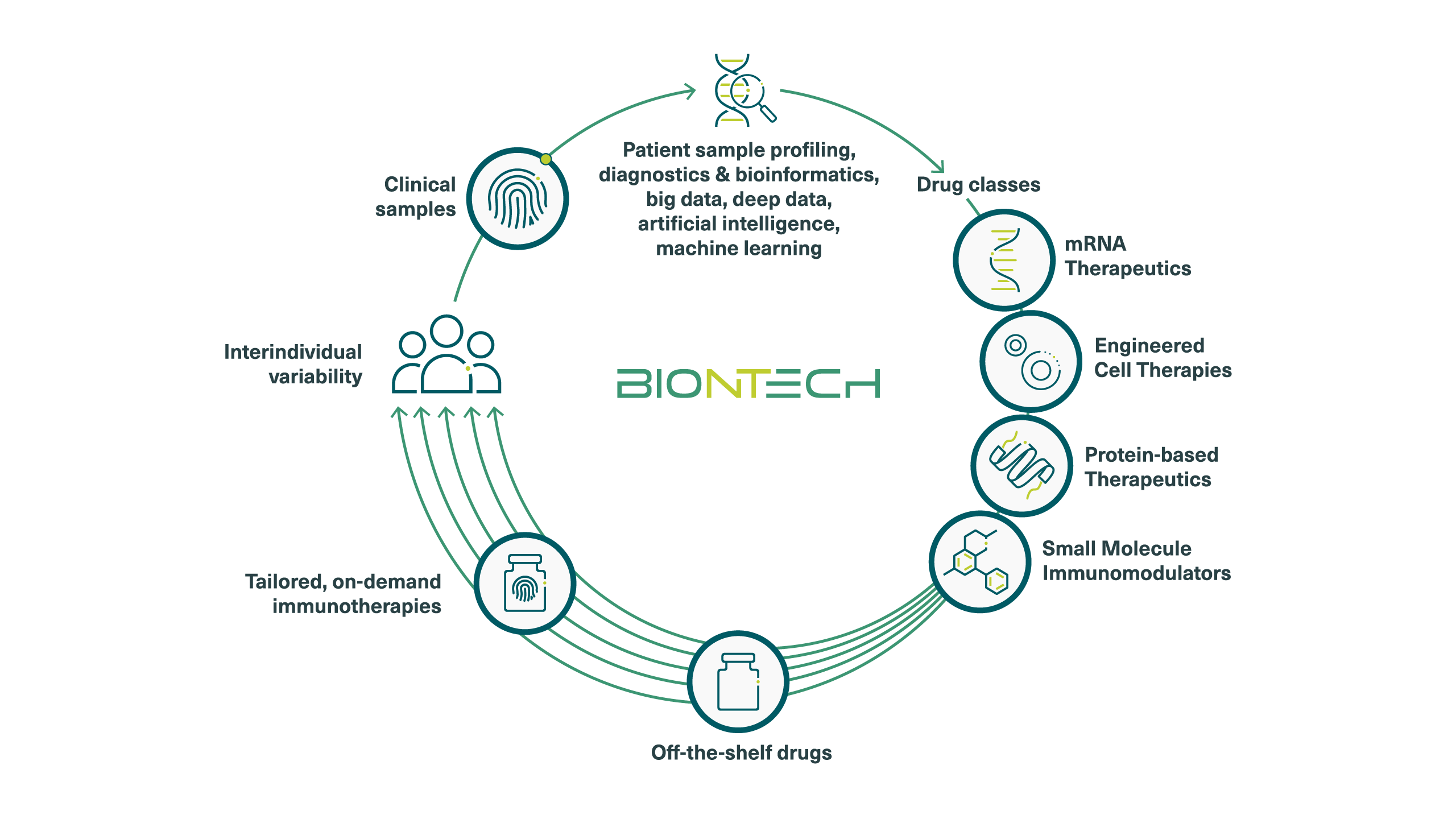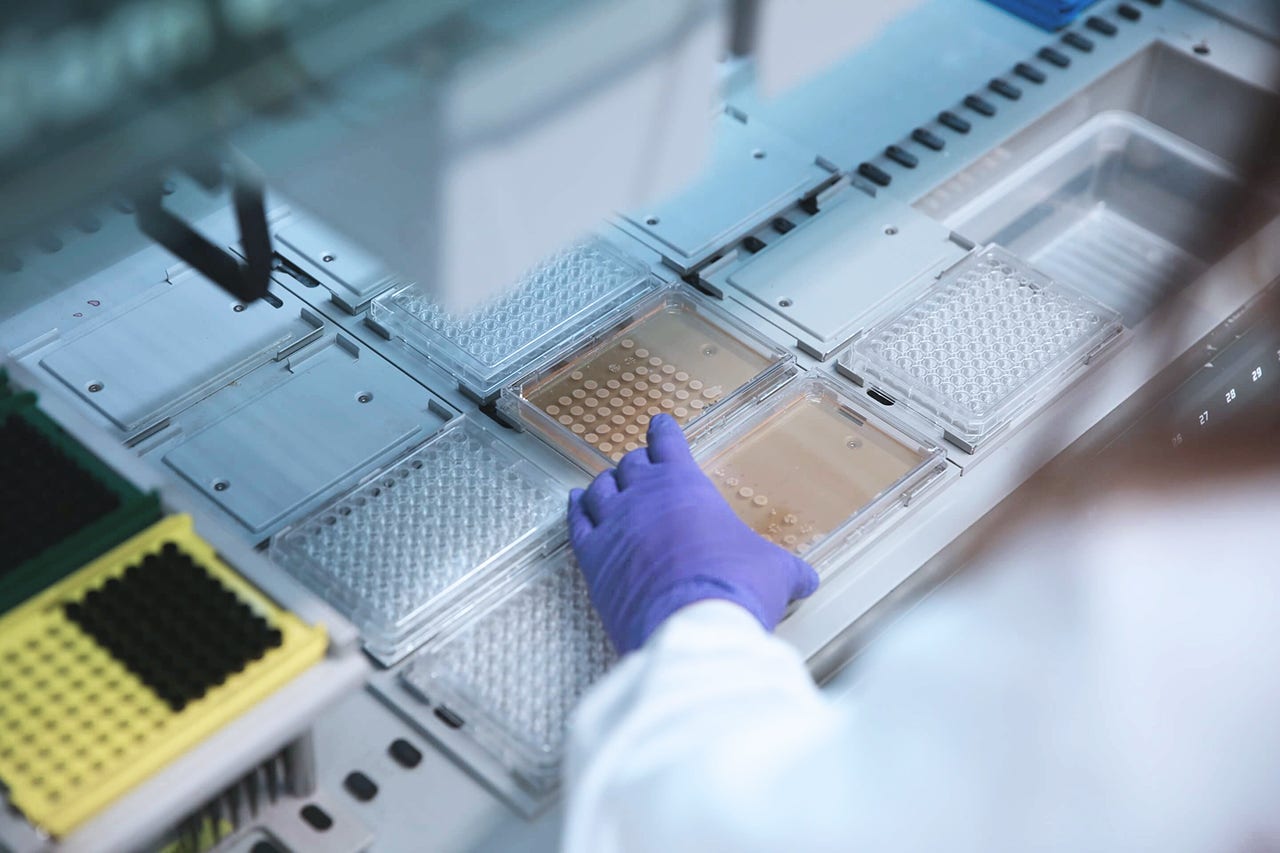Therapeutic areas
At BioNTech, we believe that the immune system is the fundamental driver for therapeutic success in cancer, infectious diseases, and other serious diseases. As immune engineers, we have a deep understanding of the underlying mechanisms that enable the immune system to effectively recognize both external threats like infectious diseases and internal threats like cancer. Our goal is to translate this expertise into new therapies and vaccines that improve standards of care or establish new ones to make a difference for individuals as well as humankind.

Every patient’s tumor is unique and so should be their cancer treatment

Every patient’s tumor is unique. Their treatment should be as well.

We are committed to developing mRNA-based vaccines to address life-threatening infectious diseases

We are committed to develop mRNA-based vaccines addressing life-threatening infectious diseases.
Cancer
Cancer is one of the most challenging diseases in human health, accounting for nearly 10 million deaths worldwide in 2020 according to the World Health Organization. A complex interplay between environmental factors and genetic make-up, cancer transforms healthy cells into malignant cells in a multi-stage process.
Understanding Immunotherapy
Immunotherapy uses proteins made by the body or in a laboratory to train a patient’s natural defenses to find and destroy cancer cells.
Immunotherapies have already led to major treatment breakthroughs in cancer, including immune checkpoint therapies that fundamentally changed outcomes for some patients with advanced melanoma, as well as the preventive vaccine for cervical and liver cancer.
However, every cancer type is unique, and we believe that immunotherapies should address each cancer indication in a different way. That is why we have established a range of technology platforms and tools aimed at the development of the best treatment options for each tumor indication.
Towards patient-specific cancer treatments
We believe that harnessing complementary, potentially synergistic modes of action could increase the likelihood of therapeutic success, reduce the risk of emergence of secondary resistance mechanisms, and also unlock a larger potential patient population. Critically, this approach allows us to pursue a technology-agnostic path by developing an appropriate therapeutic platform or a combination thereof for the intended patient and purpose.

Development of new treatment options
As part of our fundamental research, we discover and exploit novel targets and target combinations to extend the utility of immunotherapy aiming to help as many cancer patients as possible.
We engineer and develop highly potent drug candidates designed to avoid compromising precision for the specific target. We further augment activity and counteract resistance mechanisms by combining compounds.
In several cases, cancer recurrence following therapy is a consequence of a lack of complete tumor eradication, which is mainly driven by the biological variability of each tumor. Addressing this biological reality is one of the mandatory design aspects of the product candidates we develop. For example, each of our cancer immunotherapies incorporates multiple targets in order to account for this variability so that each compound can be a potential treatment option for many patients.
These four guiding principles have helped us to build a broad suite of therapeutic platforms, optimized for a distinct mode of action, high precision, high potency and efficacy.

In our oncology therapeutic programs, we have treated over 1,600 patients across more than 20 solid tumor types by the end of 2022. Five of these programs are being evaluated in randomized Phase 2 trials.
Infectious Diseases
We aim to develop new prophylactic vaccines as well as therapeutics against various infectious diseases as there is substantial unmet medical need. We are committed to deploying our full suite of technologies and immunotherapeutic expertise to develop mRNA-based as well as protein-based vaccines and therapeutics against emerging and existing infectious diseases.
We believe the technology behind our COVID-19 vaccine has potential against a range of other infectious diseases.
We are investing in vaccine development programs to address diseases with a massive health burden – especially in lower income countries – such as malaria, tuberculosis and HIV.
Our goal is to establish a new standard of care with our products.
Our therapeutic focus areas
COVID-19
The global COVID-19 pandemic halted the world following its official declaration in March 2020. We focused our efforts early on and successfully developed the first mRNA-based COVID-19 vaccine as well as variant adapted vaccines.
Malaria
Malaria is a life-threatening disease, caused by parasites that are spread through Anopheles mosquitoes. With half of the world population at risk of malaria and a large part living in lower to middle income countries, there is an urgent need to protect the most vulnerable populations worldwide. BioNTech initiated a clinical phase 1 trial for an mRNA-based malaria vaccine candidate at the end of 2022.
Tuberculosis
Tuberculosis is a severe air-borne disease caused by infection with the bacterium Mycobacterium tuberculosis, which can cause severe complications such as pulmonary parenchyma, among other things, and can be fatal. The vast majority of cases and deaths are in developing countries, thereby creating a huge burden for vulnerable communities. BioNTech is working with the Bill and Melinda Gates Foundation to develop a vaccine that prevents tuberculosis infections which entered the clinic at the beginning of 2023.
Vaccines and therapeutics for several high unmet medical need indications
Our approach of mRNA-based vaccines can offer many benefits in terms of battling infectious diseases, ranging from shorter manufacturing times to not exposing patients to infectious elements as well as the opportunity to address emerging virus variants in a rapid manner. In addition to malaria and tuberculosis, BioNTech is currently developing a vaccine candidate for HIV.
In addition, we develop novel approaches to treat bacterial infections. Our synthetic lysin candidates are derived from naturally occurring viral proteins that have the potential to improve the standard of care for a range of bacterial infections while potentially offering a unique opportunity to address one of modern medicines’ biggest challenges: antibiotic resistance.
As a science-driven company, we continuously investigate new opportunities and approaches aimed at efficiently addressing infectious diseases.

